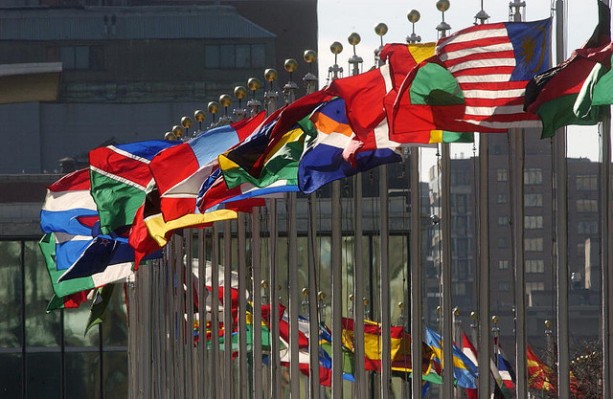
Neither hard power nor soft power will be the key to winning the race for prosperity or global influence tomorrow. Rather, says, Joseph S. Nye Jr., author of The Future of Power, successful nations will deploy “smart power.” Nye visits Zócalo to discuss his new book on March 29.

In his inaugural address in 2009, President Barack Obama stated that “our power grows through its prudent use; our security emanates from the justness of our cause, the force of our example, the tempering qualities of humility and restraint.” Similarly, Secretary of State Hillary Clinton said, “America cannot solve the most pressing problems on our own, and the world cannot solve them without America. We must use what has been called ‘smart power,’ the full range of tools at our disposal.” Earlier, in 2007, Secretary of Defense Robert Gates had called for the U.S. government to commit more money and effort to soft power tools including diplomacy, economic assistance, and communications because the military alone could not defend America’s interests around the world. He pointed out that military spending then totaled more than half a trillion dollars annually compared with a State Department budget of $36 billion. In his words, “I am here to make the case for strengthening our capacity to use soft power and for better integrating it with hard power.” What does this mean? How will power work, and how is it changing in the twenty-first century?
To answer such questions, we need to have a better understanding of power than is typical in most current discussions. Let me give two examples, one personal and one public.
In the mid-1970s, France agreed to sell Pakistan a nuclear reprocessing plant that could extract plutonium, a material that could be used either for civilian purposes or for bombs. Concerned about the spread of nuclear weapons, the Ford administration tried to stop the plant by buying off Pakistan with high-performance aircraft, but Pakistan refused the deal. Both the Ford and Carter administrations tried to prevail upon France to cancel the sale, but the French refused on the grounds that it was a legitimate sale for civilian purposes only. Nothing seemed to work until June 1977, when I was in charge of Jimmy Carter’s nonproliferation policy and was allowed to present French officials with new evidence that Pakistan was preparing a nuclear weapon. A top French official looked me in the eye and told me that if this were true, France would have to find a way to cancel the completion of the plant. Subsequently, he was as good as his word, and the plant was not completed. How did the United States accomplish this major objective? No threats were issued. No payments were made. No carrots were dangled or sticks brandished. French behavior changed because of persuasion and trust. I was there and saw it happen. This hardly fits the usual model of power that is prevalent in most editorials or in recent foreign policy books that do not consider persuasion a form of power because it “is essentially an intellectual or emotional process.”
More recently, in August 2008, China and Russia provided sharp contrasts in the use of power. As French analyst Dominique Moisi wrote at the time, “Whereas China intends to seduce and impress the world by the number of its Olympic medals, Russia wants to impress the world by demonstrating its military superiority – China’s soft power versus Russia’s hard power.” Some analysts concluded that the Russian invasion of Georgia proved the “irrelevance” of soft power and the dominance of hard military power. In reality, the story turned out to be more complicated for both countries in the long run.
Russia’s use of hard power undercut its claims to legitimacy and sowed fear and mistrust in much of the world. European neighbors became more wary. An immediate cost was Poland’s reversal of its resistance to an American antiballistic missile system. When Russia appealed for support on its Georgian policy to other members of the Shanghai Cooperation Organization, China and others withheld their support. An analysis one year later concluded that Russia’s appeal to its neighbors did not sound very seductive. “Ideally, it would present an attractive model for its neighbors, politically and economically. Young generations would learn Russian because they wanted to, and the post-Soviet alliances would be clubs its neighbors are lining up to join.” As Russian analyst Alexei Mukhin summed the matter up, “Love bought with money will not last long. That is purchased love. It is not very reliable.”
In contrast, China ended August with its soft power enhanced by its successful staging of the Olympic Games. In October 2007, President Hu Jintao declared China’s intent to increase its soft power, and the Olympics were an important part of that strategy. With the establishment of several hundred Confucius Institutes to promote Chinese culture around the world, increased international broadcasting, attraction of foreign students to its universities, and softer diplomacy toward its neighbors in Southeast Asia, China made major investments in soft power. Opinion polls showed an increase in its international reputation. By accompanying its growth in hard power with an attractive soft power narrative, China was trying to use smart power to convey the idea of its “peaceful rise” and thus head off a countervailing balance of power.
From The Future Of Power by Joseph S. Nye Jr. Copyright 2011. Reprinted by arrangement with PublicAffairs, a member of the Perseus Books Group.
Buy the book: Skylight Books, Powell’s, Amazon
*Photo courtesy of United Nations Photo.




Send A Letter To the Editors